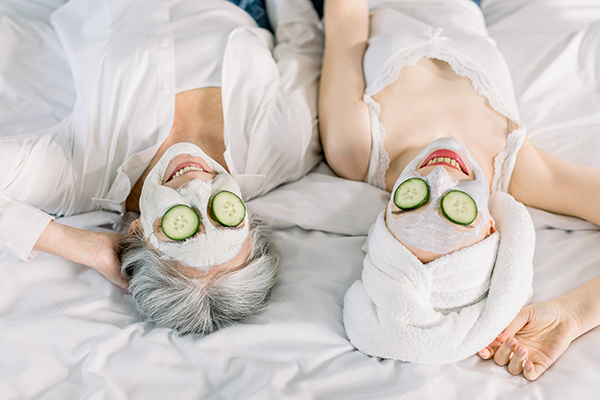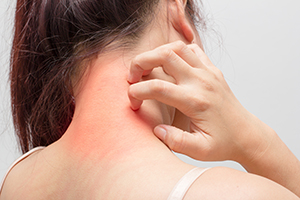
Were you a teen who looked forward to leaving puberty behind if only to leave the acne that came with it? You may be like many women in their 20s, 30s, 40s and even 50s who look in the mirror and think, “Are you kidding? Pimples at my age?”
Not Everyone Outgrows Acne
The truth is, if you’re age 20 and older and dealing with acne, you aren’t alone. A study by the American Academy of Dermatology found that after the teen years, adult acne is common, especially for a surprising number of women:
- 50% in their 20s
- 35.2% in their 30s
- 26.3% in their 40s
- 15.3% in their 50s
What's Behind the Breakouts?
There are different reasons for adult acne, but hormones are the common denominator. That’s why adult acne is often called hormonal acne.
First, let’s review how acne develops. The main culprits behind acne are sex hormones released by the adrenal glands, ovaries and testes. Hormones stimulate your body’s oil glands (the sebaceous glands) to produce more skin oil (sebum). The excess combines with dead skin cells and bacteria to clog pores, causing breakouts ranging from mild to severe that can appear as:
- Blackheads
- Cysts
- Pimples
- Whiteheads
During puberty, breakouts usually happen in the face’s T zone, which includes the forehead, nose and chin. However, with hormonal acne, the bottom part of your face, which includes the bottom of your cheeks and around your jawline, is typically where breakouts happen.
What Triggers the Hormones That Cause Acne?
If you think about the times your hormones seem to run amok — like during puberty, your monthly period, pregnancy, perimenopause and menopause — it makes sense why your complexion might take a hit, right? It’s not necessarily that your hormones go haywire during those times. Most likely they don’t. They’re just changing.
Certain medical conditions can also cause hormone fluctuations. For example, when the ovaries churn out too many male hormones, it throws the reproductive hormones off balance, resulting in a condition called polycystic ovarian syndrome (PCOS). And acne is one of the many symptoms of PCOS.
Genetics also come into play. If a parent or sibling has acne, you may be more likely to get adult acne.
Other factors can contribute to hormone ups and downs, too, such as:
- Sleep. When your sleep-wake cycle gets knocked around (think late-night Netflix binges, crying babies, the night sweats of menopause), you wake up tired and your body bumps up hormone production.
- Stress. Researchers have tied acne flair-ups to stress. When you’re under stress, your body releases more hormones, which sets off the acne-producing cycle.
- Sugar. Recent studies show that sugar can cause acne. And foods high on the glycemic index (those that spike blood sugar) are the biggest troublemakers.
How Do You Treat Hormonal Acne?
Hormonal acne isn’t something you have to live with. It’s very treatable. It may take a little time to figure out what works best for you. But being patient, and staying the course, will be worth it.
It’s also important not to put treatment off. Continued breakouts can lead to permanent scarring.
Do a Lifestyle Checkup
Fortunately, clearing up hormonal acne is possible with simple lifestyle changes, from eating healthier foods and getting the sleep you need to developing ways to keep ongoing stress at bay.
The way you care for your skin also adds up. And the products you use matters. Choose everyday skincare products and sunscreens that are noncomedogenic and oil-free.
Consider Over-the-Counter (and Prescription) Acne Products
If you have mild-to-moderate hormonal acne, you can usually get acne under control without over-the-counter products. But staring at rows of acne products or being hit with endless online ads can make choosing the “right” one difficult. Dermatologists recommend narrowing the field by looking for products that contain one of these ingredients:
- Benzoyl peroxide kills bacteria and clears pores
- Retinoids unclogs pores and reduces oiliness
- Salicylic acid reduces inflammation and clears pores
But if at-home treatments aren’t doing the job or you have severe acne and risk scarring, prescription treatment may be necessary. Dermatologists can prescribe:
- Antibiotics to reduce bacterial inflammation
- Birth control pills or spironolactone, which control hormones
- Oral retinoids that work on skin cells to help prevent clogged pores
- Topical retinoids that help exfoliate, or renew, the skin
Need More Help?
Our dermatologists can work with you to create a treatment plan specific to your condition and that fits well into your everyday routine.
Related Articles

November 7, 2024
10000 Steps Good Enough
How many steps did you log today? It’s a popular question, and the gold standard answer is 10,000. Yet, depending on your health goals, you may need to pick up the pace.

June 1, 2019
5 Day Meal Prep
Who says eating healthy has to be difficult? One of our Registered Dietitians shows us how easy it can be to prep lunches for a busy week.

June 1, 2019
5 Foods With Health Benefits
Dark ChocolateBoost your mood and your memory (think antioxidants) by savoring dark chocolate. It may also help your heart health. Just 1 oz. is all it takes...

December 9, 2019
5 Free Indulgences
Are you ready for the hubbub of the holidays? The season’s festivities are always fun, but they can also wear you down. If your holiday spirit needs rechargi...

June 1, 2019
5 Minutes to a Happier You
Feeling stressed, angry or anxious? Head to the great outdoors. A new study has found that a five-minute walk can work wonders for your mood.The more natural...

July 27, 2022
5 Must Have Nutrients
Vitamins and minerals do a body good, but who has time to figure out which foods offer what benefits? This short list of five essential nutrients, opens new ...


